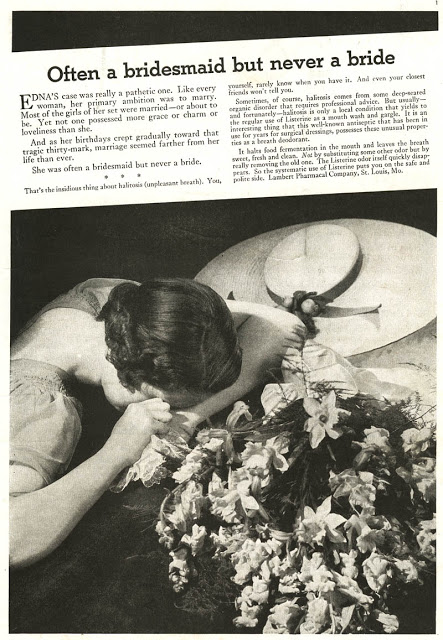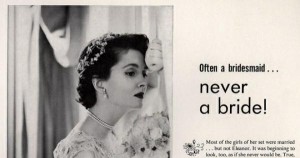Often a bridesmaid . . .
Often a bridesmaid . . .
 Did you know that 100 years ago, very few people were concerned about body odor or bad breath? Back then, people weren’t focused on covering up the odors that were produced by their bodies. Their primary aim was to just get through the day. Simple things, like taking a bath, were difficult and time-consuming.
Did you know that 100 years ago, very few people were concerned about body odor or bad breath? Back then, people weren’t focused on covering up the odors that were produced by their bodies. Their primary aim was to just get through the day. Simple things, like taking a bath, were difficult and time-consuming.
Because homes were not equipped with electricity or hot water, when a person wanted to take a bath, he or she had to pour water into a large pot and then place the pot on a stove to heat up the water. After the water was hot, it was poured into a wash-tub that was placed on the kitchen floor next to the stove. After the wash-tub was filled, the person sat and bathed in the wash-tub near the stove, where it was warm.
Life started getting a little easier during in the early 1900s, when electricity and hot water became available in people’s homes. It was also at that time that companies started becoming more sophisticated about advertising personal hygiene products. One such company was Lambert Pharmaceutical Company, the maker of Listerine.
During the 1920s, the men who were running the Lambert Pharmaceutical Company came up with a brilliant idea. They decided to sell Listerine to consumers as a remedy for bad breath, which was commonly referred to as “halitosis.” Prior to that, Listerine was sold in small quantities to hospitals as a surgical antiseptic.
A year after Lambert began selling Listerine as a remedy for bad breath, the company was running ads in 80 magazines and 300 newspapers. After the first year of advertising, Lambert generated revenue of $4 million from sales of Listerine to consumers. In today’s dollars, that would be $57 million in revenue.
The most successful ads for Listerine were the ones that began with the headline, “Often a bridesmaid but never a bride!” The ads featured attractive women who looked sad and upset because they had not yet found a groom.
Most of the bridesmaid ads used the following ad copy:
Edna’s case was a really pathetic one. Like every woman, her primary ambition was to marry. Most of the girls of her set were married — or about to be. Yet no one possessed more grace or charm or loveliness than she.
And as her birthdays crept gradually toward that tragic thirty-mark, marriage seemed farther from her life than ever.
She was often a bridesmaid but never a bride.
* * *
That’s the insidious thing about halitosis (unpleasant breath). You, yourself, rarely know when you have it. And even your closest friends won’t tell you.
Sometimes, of course, halitosis comes from some deep-seated organic disorder that requires professional advice. But usually — and frequently — halitosis is only a local condition that yields to the regular use of Listerine as a mouth wash and gargle. It is an interesting thing that this well-known antiseptic that has been in use for years for surgical dressings, possesses these unusual properties as a breath deodorant.
It halts food fermentation in the mouth and leaves the breath sweet, fresh and clean. Not by substituting some other odor but by really removing the old one. The Listerine odor itself quickly disappears. So the systematic use of Listerine puts you on the safe and polite side.
We’ve come a long way since the first ads for Listerine appeared in the 1920s. Consumers now spend billions of dollars a year on products, procedures, and surgeries that help them look, smell, and feel better. Most people spend more than an hour each day on personal hygiene and the beautification process. A hundred years ago people spent minutes on their bodies and looks. Now they spend in excess of an hour a day on their bodies and looks.
 While a majority of people are willing to spend a significant amount of time every day to look, smell, and feel good, they’re unwilling to spend a significant amount of time every day to pray and perform the corporal and spiritual works of mercy.
While a majority of people are willing to spend a significant amount of time every day to look, smell, and feel good, they’re unwilling to spend a significant amount of time every day to pray and perform the corporal and spiritual works of mercy.
At the end of our lives, will all the time and money we spent on our bodies matter? Some of it will, because we were able to look presentable and be good examples to our children and grandchildren in the way we took care of ourselves. Ultimately, however, when our bodies are rotting in our graves, it won’t matter whether we took a shower every day, wore makeup, applied deodorant, or used mouthwash.
What will matter after we die is what we did on a daily basis to help us develop a closer relationship with God. What will also matter is what daily sacrifices we made so that we would become less self-centered and more willing to reach out to others by performing the corporal and spiritual works of mercy. This is what Jesus was referring to when he said that the most important commandments are to love God with all our hearts, souls, minds, and strength, and to love our neighbor as ourselves.
It’s okay to work on making our bodies look and smell good, but the ultimate test will be how our souls look and smell at the end of our lives.




4 Comments
Hi Harry, well said. Thanks for your grasp of the old ways of life, and your awakening call to focus on our life after Listerines of this world. Have a blessed week ahead.
Charles.
Hello Charles – Good to hear from you. The hardest part of each day is trying to remain focused on what we know should be doing. Any analogy we can use or ritual we can put into place to help us focus helps. Take care, Harry
Dear Harry and Georgette – Having my computer die, and having now received a new laptop – I have 66 emails to catch up with! I enjoyed reading your Listerine history! Brings back memories of the many remedies – some of which work and some that do not!!! Lots of money has been spent on such. Thank you for the research! Love you, pray for you! Sister Roberta
Hello Sister – I think you wear out your computers by using them to frequently communicate with your multitude of friends. I look forward to hearing from you every week. Thanks for your love and support. Harry